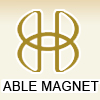Product (223)
- Permanent Magnets (24)
-
Neodymium Magnets
(83)

-
Ferrite Magnets
(19)

- AlNiCo Magnets (4)
- SmCo Magnets (4)
- Flexible Magnets (4)
- Speaker Magnets (6)
- Magnetic Products (21)
- Magnetic Assemblies (2)
- Wind Generator Magnets (1)
- Brushless Motor (48)
- Servo Motor (5)
- Others (2)
Equipments (8)
News (29)
FAQ (30)
Uses for Neodymium Magnets (2)
Neodymium Magnet Information (1)
Neodymium Magnet Safety (1)
Neodymium Magnet Physical Properties (1)
Magnet Glossary (1)
Quality Control (1)
Credit Report
Products Index
Company Info
Ningbo Able Magnetic Co., Ltd. [China (Mainland)]
Business Type:Manufacturer, Trading Company
City: Ningbo
Province/State: Zhejiang
Country/Region: China (Mainland)
News
China Revamps Rare-Earth Exports
BEIJING—China unveiled an initial cut of 27% in its quota for rare-earth exports for next year, but said its full-year 2012 limits for the key materials used to make everything from defense systems to turbines to iPhones would likely be unchanged amid weakened demand.
China controls about 95% of global rare-earth supply and has been reducing its export quotas to secure greater control over prices, leading to a surge in prices over the past two years. But demand has eased significantly this year in the face of higher prices, as mining companies outside China look to tap new sources and companies find ways to reduce their use of the metals.
Tuesday, officials unveiled a new system that would split the quota among different types of rare earths, a move that could help better match exports with demand. It also disclosed a new system that would exclude from the quota mining companies that didn't meet its environmental standards.
A sharp cut in the first tranche doesn't necessarily indicate a drop in full-year quotas. Last year, China cut its first-half export quota by more than one-third, but the full-year quota was only slightly below that of 2010's 30,258 tons.
The ministry set its first tranche of export quotas, a 27% cut to 10,546 metric tons compared with a year ago. Typically the first tranche represents exports for roughly the first half of the year, while a second quota is issued sometime around July.
But it also said its 2012 full-year quota would likely match this year's. It cited the fact that this year's current export quota hasn't yet been used up. The government capped the 2011 export quota at 30,184 tons, but only about half the quota, or 14,750 tons, had been shipped out in the first 11 months, the ministry said.
The ministry said in a statement that "in order to protect international demand and maintain the basic stability of rare-earth supplies, the total export quotas for 2012 and 2011 will be basically the same."
Prices for rare earths can be difficult to determine because they are sold in only small amounts and through private transactions. But industry observers say prices, and broader global demand, have been falling since June, although they remain well above last year's levels. Prices for lanthanum oxide are down nearly 60% from the third-quarter average, while cerium oxide is down 58% in the same period, according to data from Australian rare earth producer Lynas Corp.
More than 350 rare-earth mine projects outside China and India are now under development by some 200 companies in 35 countries, IHS Global Insight senior economist John Mothersole said. Toyota Motor Corp., Renault SA and Tesla Motors Inc., which are major automotive consumers of rare earths, earlier this year separately said they plan to stop using parts that have rare-earth elements in their cars.
"The commerce ministry is likely to have considered the fact that China's rare-earth inventories are relatively full and there's still surplus left over in the current quotas," said Jin Bosong, deputy director of the ministry's International Trade and Economic Cooperation Research Institute, ahead of the ministry's disclosure Tuesday.
China's quota system has generated opposition from the U.S. and others, who argue that it violates trade agreements. China has said its policy adheres to its World Trade Organization commitments.
For the first time, Beijing split its 2012 quota into light and medium-to-heavy categories.
For 2012, it approved the export of 9,095 tons of light minerals and 1,451 tons for the medium-to-heavy category. Light rare earths are used for applications like magnets. Heavy rare earths, which are used in more technologically sensitive areas and seen by exporters as more lucrative, had been more greatly represented in past exports. Heavy rare earths are found mostly in southern Chinese provinces like Guangdong and Jiangsu, while light rare earth is largely found in Inner Mongolia.
Conscious of efforts to portray its quota reduction as protectionism, Beijing has emphasized the environmental damage caused by rare-earth mining. On Tuesday it unveiled a new system that would exclude from the quota companies that didn't meet its environmental standards. The list of pending applications totaled 14,358 tons among 20 companies
The government appears to be putting on notice companies that haven't fully answered the government's environmental requirements, including heavyweights such as Inner Mongolia Baotou Steel Rare Earth Group Hi-Tech Co. Ltd. Baotou officials couldn't be reached on Tuesday. On Monday it said in a statement that it satisfied its environmental requirements.
In the transcript of a question-and-answer session accompanying its statement, the ministry said only 11 companies were granted export rights, adding that "the ministry has set up a pending-approval list for applicants that need further environmental review."
Pre Page:
Create space-saving bath storage
Next Page:
China Baotou to Halt Rare Earth...
.gif)


